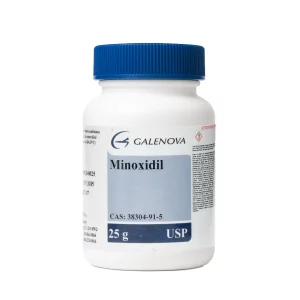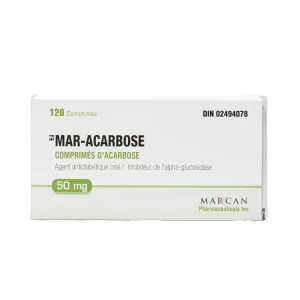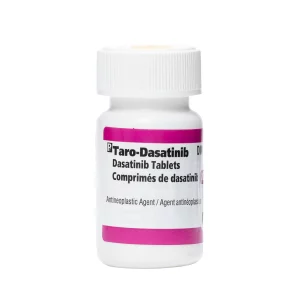Your cart is empty.
Your cart is empty.
Polycystic ovary syndrome affects millions of women worldwide, leading to irregular periods, hormone imbalances, and fertility challenges. Acarbose, originally developed to support healthy blood sugar levels, is now being explored for broader applications, including PCOS symptom management. Because insulin resistance plays a central role in PCOS, improving glucose metabolism may help address its root causes.
Recent studies suggest that Acarbose reduces inflammation, which may ease many of the systemic effects tied to PCOS. In addition, researchers are exploring the cognitive benefits of Acarbose, as hormonal and metabolic imbalances in PCOS are often linked to mood and cognitive challenges. These findings also connect to emerging research on Acarbose for longevity, supporting its potential to improve long-term health outcomes. This comprehensive guide examines the science behind using acarbose for PCOS, highlighting its effects on insulin resistance, hormone regulation, inflammation, and overall quality of life for women seeking better symptom control.
PCOS is a hormonal disorder marked by irregular periods, excess androgens, and insulin resistance. Common symptoms include weight gain, acne, excess hair growth, and fertility issues. Insulin resistance worsens hormone imbalances by elevating insulin levels, which stimulate excess androgen production. This hormonal cascade disrupts ovulation and menstrual regularity, making insulin resistance treatment vital for managing PCOS effectively.

Acarbose inhibits alpha-glucosidase enzymes in the small intestine, blocking the breakdown of complex carbohydrates into glucose. Originally for diabetes, it prevents post-meal blood sugar spikes, promoting steadier glucose and insulin levels. Researchers became interested in acarbose for PCOS because improved insulin resistance often results in better hormone balance and symptom relief.

Insulin resistance drives PCOS by triggering excess androgen production in the ovaries, causing irregular cycles and fertility problems. It also lowers sex hormone-binding globulin, increasing active hormone levels. This metabolic-reproductive interaction underscores the importance of addressing insulin resistance in PCOS treatment.
By reducing post-meal glucose spikes, acarbose lowers overall insulin demand, improving insulin sensitivity and hormone balance. Studies show significant decreases in testosterone and increases in sex hormone-binding globulin. Blood sugar control tackles PCOS root causes, leading to improvements in multiple symptoms.
Clinical trials generally use daily acarbose doses ranging from 150 to 300 mg, administered over 3 to 6 months, in women with varying weights and metabolic profiles. Research consistently reports improvements in menstrual regularity, reduced testosterone levels, and enhanced insulin sensitivity. Additional benefits include better lipid profiles and reduced markers of systemic inflammation. Many of these findings come from randomized controlled studies comparing acarbose to placebo, providing promising, though still preliminary, evidence of its role in PCOS management.
One of the earliest and most noticeable benefits of acarbose for many women with PCOS is the normalization of menstrual cycles. Improved insulin resistance supports the restoration of regular ovulation by addressing metabolic disruptions that interfere with the reproductive cycle. Studies have shown increases in menstrual frequency and cycle predictability, with many participants reporting resumption of regular periods after several months of treatment. These hormonal changes typically precede other symptom improvements, highlighting the importance of sustained therapy and patience.
Excess body weight and fat distribution can worsen insulin resistance and hormonal imbalances in PCOS. Acarbose may support weight management by reducing the amount of glucose absorbed from meals and enhancing insulin sensitivity. Clinical studies indicate modest but clinically meaningful reductions in body weight and fat mass, especially in overweight women. These benefits are often linked to decreased hunger and reduced cravings due to more stable blood sugar levels, making weight control more achievable when combined with lifestyle changes.
Acarbose lowers androgen excess by improving insulin sensitivity and decreasing ovarian hormone stimulation. Research documents reductions in testosterone and androstenedione, leading to improvements in acne and excess hair growth as androgen levels normalize.
Acarbose may enhance fertility by promoting regular ovulation through better hormone balance. Studies show improved reproductive hormone ratios and higher pregnancy rates compared to controls, though results vary individually. Improved metabolic health supports reproductive function.
By reducing androgen excess, acarbose improves acne and skin texture. Effects on excess hair growth appear gradually as hormone levels stabilize. Cosmetic improvements correlate with hormonal and metabolic regulation.
Dosage and treatment plans must always be personalized and determined by qualified experts according to each patient’s specific health status and needs.
Studies have commonly used daily doses of 150 to 300 mg of acarbose divided with meals, with gradual dose escalation to reduce digestive side effects while maximizing benefits. Taking acarbose with meals helps optimize blood sugar control. However, actual dosing may vary, and self-medication is strongly discouraged.
Hormonal and metabolic changes often precede visible symptom relief, which typically appears within 3-6 months. Menstrual improvements are usually noticed first, while skin and hair changes may take longer. Patience and adherence to professional guidance are essential for meaningful progress.
Acarbose complements comprehensive PCOS management by targeting insulin resistance while other treatments address reproductive or cosmetic symptoms. Combined with lifestyle changes and medications, acarbose can enhance overall outcomes, reflecting PCOS’s multifaceted nature.
Women with significant insulin resistance, metabolic PCOS features, and elevated insulin levels tend to respond best. Overweight women often experience more dramatic improvements, though those with normal weight but insulin resistance may also benefit.
Tracking testosterone, insulin sensitivity, and menstrual regularity every 3–6 months helps assess progress. Improvements include normalized hormones, reduced symptoms, and better metabolic markers, with medical supervision optimizing outcomes.
Sustained use supports ongoing hormone balance, metabolic health, and lowers diabetes and cardiovascular risks. Reproductive benefits can continue long term, with safety supported by research beyond reproductive years.
Women report better energy, more regular cycles, and reduced symptoms. Many track progress via apps and lab tests, noting enhanced quality of life. Individual response varies with insulin resistance severity influencing outcomes.
Studies show hormone and metabolic improvements, especially in insulin-resistant women, though responses vary.
Research suggests improved ovulation and pregnancy rates; consultation with specialists remains important.
Most women notice changes within 3–6 months, with hormone shifts often preceding visible effects.
Symptoms linked to insulin resistance and androgen excess, like irregular periods and metabolic problems, improve most.
Combination therapies often work better, but should be managed by healthcare providers.
It’s most effective for insulin-resistant PCOS; other forms may respond less dramatically.
Ciotta, L., Calogero, A. E., Farina, M., De Leo, V., La Marca, A., & Cianci, A. (2001). Clinical, endocrine and metabolic effects of acarbose, an alpha-glucosidase inhibitor, in PCOS patients with increased insulin response and normal glucose tolerance. Human Reproduction, 16(10), 2066-2072.
https://pubmed.ncbi.nlm.nih.gov/11574493/
Penna, I. A., Canella, P. R., Reis, R. M., Silva de Sá, M. F., & Ferriani, R. A. (2005). Acarbose in obese patients with polycystic ovarian syndrome: a double-blind, randomized, placebo-controlled study. Human Reproduction, 20(9), 2396-2401.
https://pubmed.ncbi.nlm.nih.gov/16006454/
Tugrul, S., Kutlu, T., Pekin, O., Baglam, E., Kiyak, H., & Oral, O. (2008). Clinical, endocrine, and metabolic effects of acarbose, an α-glucosidase inhibitor, in overweight and nonoverweight patients with polycystic ovarian syndrome. Fertility and Sterility, 90(4), 1144-1148.
https://pubmed.ncbi.nlm.nih.gov/18377903/
Yang, Q., Zhang, W., Zhang, J., & Niu, S. (2022). Effect of acarbose combined with diet intervention on glycolipid metabolism in patients with primary polycystic ovarian syndrome complicated with impaired glucose tolerance. Pakistan Journal of Medical Sciences, 38(4), 992-997.
https://pmc.ncbi.nlm.nih.gov/articles/PMC9121947/Zhou, C., Wang, X., Chen, Z., Zhang, L., Liu, A., & Xu, D. (2022). High-fiber diet or combined with acarbose alleviates heterogeneous phenotypes of polycystic ovary syndrome by regulating gut microbiota. Frontiers in Endocrinology, 12, 806331.
https://pubmed.ncbi.nlm.nih.gov/35185786/





Unlock savings on bundles and elevate your online experience today!